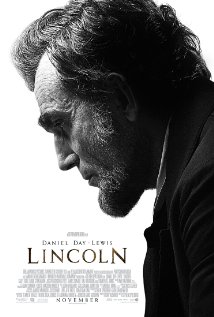Lincoln
 Part of our traditional Christmas celebration is going out to see movies. This year we saw Lincoln, which was even better than I thought it would be. Daniel Day-Lewis is a genius, as you don’t need me to point out, and Tommy Lee Jones was given a substantial amount of scenery to chew. The cast was uniformly excellent, especially Sally Field and David Strathairn, not to mention a nearly-unrecognizable James Spader. As you would expect from a Spielberg film, the pacing and cinematography were outstanding, and the usual Spielbergian sentimentality was almost entirely absent. Tony Kushner’s screenplay was witty, warm, and erudite. Perhaps most impressively, the film managed to make fights over Congressional procedures and vote-wrangling seem action-packed, even when the outcome of the vote was (presumably) known perfectly well to the audience. The movie could have been titled “House of Representatives” rather than “Lincoln,” although that might have had a somewhat depressing effect at the box office.
Part of our traditional Christmas celebration is going out to see movies. This year we saw Lincoln, which was even better than I thought it would be. Daniel Day-Lewis is a genius, as you don’t need me to point out, and Tommy Lee Jones was given a substantial amount of scenery to chew. The cast was uniformly excellent, especially Sally Field and David Strathairn, not to mention a nearly-unrecognizable James Spader. As you would expect from a Spielberg film, the pacing and cinematography were outstanding, and the usual Spielbergian sentimentality was almost entirely absent. Tony Kushner’s screenplay was witty, warm, and erudite. Perhaps most impressively, the film managed to make fights over Congressional procedures and vote-wrangling seem action-packed, even when the outcome of the vote was (presumably) known perfectly well to the audience. The movie could have been titled “House of Representatives” rather than “Lincoln,” although that might have had a somewhat depressing effect at the box office.
You can’t tell a story based on historical events, however, without people comparing your tale to reality — just like science-fiction stories will always be compared to plausible science. My impression is that Lincoln comes out pretty well on the historical-accuracy scorecard, although there are inevitable hiccups. Some of these just seem annoying and unnecessary. At one point Spader’s character mentions that Lincoln’s face appears on fifty-cent pieces; this adds nothing to the dialogue and throws the viewer out of the film, as most people know that living Presidents don’t appear on currency.
Beyond the simple standards of accuracy, an historical film inevitably requires choices of what parts of the story to tell, and which to leave behind. Lincoln manages to avoid the temptation to romanticize the Southern Cause (or really the Civil War at all) in any way — a temptation that has proven remarkably powerful for previous generations of filmmakers. But there are valid criticisms, and Ta-Nehisi Coates has a nuanced take as usual. (Some give and take with Kushner here and here.) There’s no doubt that the movie gives us a top-down, Great (White) Man, Hollywoodized view of historical events. White House servants Elizabeth Keckley, who in real life was an activist and organizer, is portrayed as a silent sufferer and blank-faced icon of moral worthiness. Frederick Douglass, the black abolitionist who was an important influence on Lincoln, is completely absent from the movie. And Lincoln himself is allowed to exhibit personal flaws and impatience when dealing with his wife, but is portrayed as a resolute believer in racial equality. He may have been, late in his life, but it was quite the journey to get there; there are many statements by Lincoln in the record of his complete rejection of fundamental equality, and he long believed that blacks should be moved back to a colony in Africa.
He evolved from those views, as far as anyone can tell when trying to understand the true feelings of someone who was admittedly a brilliant politician. But evolution is interesting, and in Lincoln we don’t see any from the main character. Maybe as a country we’re ready to see the secession of the South in unromantic terms, but we’re not quite prepared to view the Northern heroes with all their human flaws.
